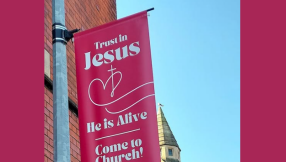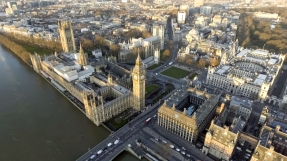
How can anyone understand our 21st century world without knowing how religious faith impacts global, national and regional events?
And why does so much of our media fail to recognise this in its coverage?
My desire, as a Christian minister and communicator, is to see a deep understanding of the role that religion plays in world events – and how faith is of vital importance to many millions of people around the globe.
For example, how to make sense of the conflict in the Middle East without a knowledge of the Jewish faith and the foundation of Israel? How to understand the motivation of US evangelical Christians in supporting Donald Trump? What is the religious dynamic in Russia’s invasion of Ukraine?
The role of religious literacy in the media seems scarcely to be addressed. When Jonathan Munro, BBC News Global Director and Director of the World Service, spoke at a Voice of the Viewer and Listener conference last autumn, he did not address the topic.
Yet the World Service has a special role in covering these issues and generally fares better than many other broadcasters. Its ‘Heart and Soul’ programme “explores and tries to explain personal experiences of spirituality and faith from around the world”.
Recent topics have included the plight of Hindus in Bangladesh, spirituality in Las Vegas, and Kaddish, the Jewish prayer for mourning the dead.
There are signs of hope – and I hope they develop further.
I welcome the growing influence of the UK’s Religion Media Centre as an “impartial and independent organisation aiming to increase further cohesion and understanding in society by helping the media report and understand religion and belief”.
To this end, the RMC provides regular online briefings for journalists on key news topics, publishes background information, holds an annual conference, arranges training sessions and links up journalists with knowledgeable experts within the faiths.
RMC declares “we are the only organisation seeking to work alongside the media on matters about religion and belief, from an impartial perspective”.
The Centre emerged from a conference in 2009, when faith leaders met journalists to understand the gulf in understanding between the two sides. Volunteers created the organisation and started activities enabling the Centre to win funding and begin its work.
The challenge facing the RMC and other organisations seeking to help journalists understand the role of faith was highlighted in a report by the Oxford-based Reuters Institute.
The research showed that nearly three out of four UK journalists polled felt that religion was of little or no importance, with just over half saying religious belief is “unimportant”. These figures were significantly higher than the wider population.
The Reuters Institute report dates from 2015 – but I’d be hard-pressed to say I’d detected any changes in outlook.
In contrast, I’d like to praise the work of the Sandford St Martin Trust in organising the UK’s most prestigious broadcast awards for radio, TV and online programmes and content that explore religious, spiritual or ethical themes.
Established in 1978, they are the only UK awards “that specifically seek out the best content that supports religious literacy across communities or promotes a better understanding of how people identify or define their place in the world, and that welcome entries about any and all faiths – or none”.
Among the 2024 winners were ITV’s ‘A Time to Die,’ looking at Britain’s current laws on assisted suicide, BBC 4’s ‘In the Name of the Father,’ based in the Breslov Hasidic community in Brooklyn, USA and Yavniel, Israel, and Radio 4’s ‘The Indestructibility of Hope,’ covering Christmas in Ukraine. Historian and broadcaster Tom Holland was given a special award by the trustees.
The awards honour – rightly – the excellent programmes produced by committed and informed broadcasters and producers. But cost-cutting across the BBC and other public service broadcasters may jeopardise these productions, including at the grassroots.
For example, the BBC has cut back on Sunday morning faith programmes that drew significant audiences on local radio stations across England. From autumn 2023, the local programmes were replaced by regional programmes, and the 39 local stations organised into 13 groups.
While London and Manchester kept their programmes, the new programme for the east of England covers an area from north London to the north-Norfolk coast. The new presenters are working hard to produce engaging radio, but the grassroots faith-based dimension has been much diminished.
Understanding faith has never been more important. When we fail to communicate, discuss and challenge it, we are missing out on one of the key elements of today’s world.
Rev Peter Crumpler is a Church of England minister in St Albans, Herts, and a former communications director with the CofE.













